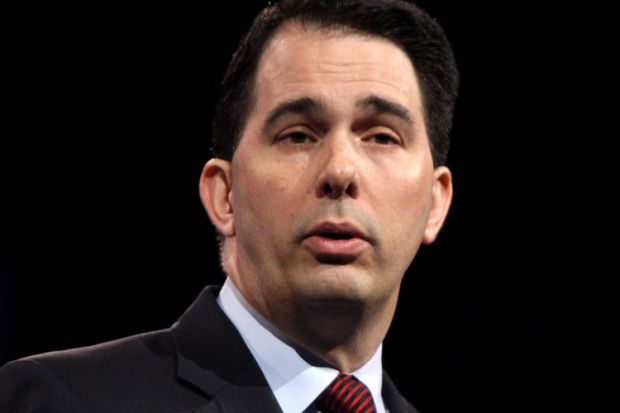Source: Gage Skidmore
Scott Walker, Wisconsin’s governor, hasn’t announced a presidential run. But it’s a safe bet that higher education will come up often if he seeks the Republican nomination, as many presume.
That’s because the second-term governor has been cast, or positioned himself, as a primary antagonist of the academy.
During the past few weeks Walker has battled with the University of Wisconsin System over budget cuts and an abortive attempt to edit the Wisconsin Idea, the century-old and unusually beloved mission statement of the university.
The tumult probably hasn’t reached the intensity it did in 2011, when Walker challenged collective bargaining for public employee unions, including those of faculty members and graduate students. Back then he also floated a plan for the state’s flagship institution, the University of Wisconsin at Madison, to leave the university system.
But the net result has been the view that while Walker’s office in the Capitol is a mile from the Madison campus, the two are worlds apart. And that can be an asset to a politician looking to cultivate the Republican base.
Alan Knox, a professor emeritus of educational leadership and policy analysis at the University of Wisconsin at Madison, told Inside Higher Ed that Walker’s budget plan “sounds more like a slogan for the Tea Party and presidential aspirations than a serious effort to look at what would improve the state or the University of Wisconsin System”.
Walker had a different take on the budget proposal, which also would grant the university more autonomy.
“The people of Wisconsin deserve a government that is more effective, more efficient and more accountable,” he said in a written statement, “and this plan protects the taxpayers and allows for a stronger UW System in the future.”
The quest for efficiency factors into another piece of Walker’s higher education budget plan. He has proposed eliminating the agency that oversees Wisconsin’s 244 for-profit institutions, the Wisconsin State Journal reported, citing a desire to “decrease the regulatory and fiscal burden” on the sector.
The oppositional narrative continued in a different form last week, when the 47-year-old governor’s lack of a bachelor’s degree was revisited by several national media outlets. Pundits jumped into the fray, debating whether Walker’s departure from Marquette University in 1990, when he was 34 credits short of earning a degree in political science and economics, would be a liability during a quest for the White House.
Walker would be the first major candidate without a college degree since 1988, when former senator Paul Simon of Illinois sought the Democratic nomination, The New York Times reported. Barry Goldwater was the most recent nominee without a degree, earning the Republican nod in 1964. And Harry Truman was the last commander-in-chief without a college degree – and the only one since 1901, according to The Times.
Yet as MSNBC reported, Democrats are unlikely to criticiseWalker’s early exit from Marquette.
The reason: to some it makes him seem more like a man of the people, meaning one of the 60 per cent of American adults who do not hold a bachelor’s or associate degree or a certificate. And a strong academic pedigree isn’t always a plus in national politics – see “Obama” and “professorial”.
The Wisconsin governor probably wouldn’t even be the only top Republican candidate without a four-year degree. Senator Rand Paul of Kentucky also kicked up a fuss last week about his college credentials. He does not hold a bachelor’s, although the medical doctor graduated from Duke University’s School of Medicine.
Walker has said he always meant to finish his degree, but time just got away from him.
“I kept thinking I’d go back, got married, had one kid, had another kid, next thing you know…you’re worrying more about paying for your kids’ college education than you are for your own,” Walker told the Milwaukee Journal Sentinel last year.
He made that statement when discussing the University of Wisconsin System’s FlexOption. That programme, which Walker pushed hard for the university to create, offers an emerging form of competency-based education.
The FlexOption is one of the most ambitious of competency-based programmes at a public university. It includes a “direct assessment” associate degree, which is completely untethered from the credit-hour standard. The feds and regional accreditors have granted approval to just four institutions for that type of degree.
With self-pacing and the ability for students to earn credits by proving knowledge through assessments, competency-based education is designed to appeal to the 31 million Americans who, like Walker, have some college credits but no degree.
One day, the governor would like to enrol in the FlexOption to finish his bachelor’s, a spokeswoman told the Journal Sentinel last year. He is waiting until the university offers the right degree, she said.
That timing may not work out, however. A presidential candidate’s schedule likely would test the flexibility of any degree programme, even a direct assessment one.
In the meantime, Walker has plenty of higher education debates to keep him busy, even if he doesn’t run for president. His proposed funding cuts, for example, would strip $300 million (£195 million) from the system’s budget during the next two years – a 13 per cent reduction in the state’s contribution.
Register to continue
Why register?
- Registration is free and only takes a moment
- Once registered, you can read 3 articles a month
- Sign up for our newsletter
Subscribe
Or subscribe for unlimited access to:
- Unlimited access to news, views, insights & reviews
- Digital editions
- Digital access to THE’s university and college rankings analysis
Already registered or a current subscriber?
